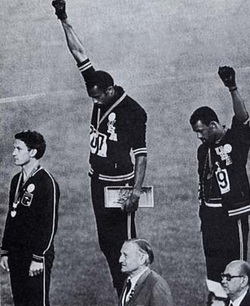Tommie Smith and John Carlos were both track and field stars at San Jose State in the 1960s. In 1967 during their time there, a professor in the department of Sociology, Harry Edwards, founded the Olympic Project for Human Rights (OPHR). It was the outgrowth of a protest that had been organized for the first day of classes to protest racial discrimination in sports. Out of it Edwards created the Olympic Committee for Human Rights (OCHR) which formed the OPHR. It was established as a protest group against apartheid in South Africa, racism in the United States and racism in sports in general.
Many prominent black athletes, including Smith and Carlos, were members of the OPHR, which decided to organize a boycott of the 1968 Mexico City Olympic Games. However, many black athletes felt torn about the OPHR boycott because they wanted to compete in the preeminent world event but also they felt a responsibility to alleviate the bad conditions that black athletes often faced compared to their white counterparts. During this time the International Olympic Committee readmitted South Africa to the Olympics. In response, nearly every African nation and many other developing nations withdrew their teams. As pressure continued to mount, the IOC reversed their decision, re-expelling South Africa. At the U.S. Olympic Trials the OPHR’s boycott was cancelled due to inadequate support. However, Tommie Smith and John Carlos, both integral members of the OPHR, had qualified to go to Mexico City as part of the U.S. Olympic Team.
In Mexico City, Smith finished first in the 200-meter dash, setting a new world record, while Carlos finished third. On the victory stand, they decided to each wear one black glove and, while the American National Anthem played, they each raised a gloved fist over their head in the black power salute. Additionally, they wore no shoes, just black socks, to symbolize the poverty in black America.
Subsequently, the IOC kicked them out of the Olympic Village and when they returned home, many Americans were upset with them as well; their families even received death threats. Both of them continued in athletics. Smith later played football with the Cincinatti Bengals before becoming a assistant professor at Oberlin and a U.S. National Team coach. Carlos played football for the Philadelphia Eagles before working as a community liason for the 1984 Los Angeles Summer Olympics.
They are still remembered though for one of the most overt political statements in the 100-year-plus history of the modern Olympic Games.
Photo courtesy of Hard Road to Glory, AP/Worldwide Photos

